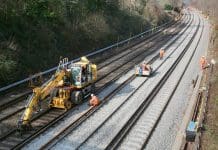Transport for London (TfL) has nominated the Riverlinx consortium as preferred bidder to design, build, finance and maintain the Silvertown Tunnel
TfL has confirmed that the Riverlinx consortium, comprising of Aberdeen Standard Investments, BAM PPP PGGM, Cintra, Macquarie Capital and SK Engineering & Construction (SK E&C), has been named as the preferred bidder to build the Silvertown Tunnel – a new river crossing under the Thames in east London.
The tunnel, which is set to be open in 2025, will link the Greenwich Peninsula and the Royal Docks together and effectively eliminate the serious congestion and reduce the associated environmental impacts caused by miles of standing traffic around the Blackwall Tunnel area.
It will remove barriers for people in east London needing to cross the river for work or leisure as well as improve the reliability and resilience of the road network for local residents, commuters and businesses. It is also the first permanent road crossing to be constructed across the River Thames east of Tower Bridge since the QE2 Bridge at Dartford opened in October 1991.
The Blackwall Tunnel is the least reliable of London’s crossings and was closed more than 700 times in 2017/18. The lack of alternative crossings east of Tower Bridge has resulted in almost constant congestion and the approach roads having some of the highest levels of air pollution in London.
By effectively eliminating congestion, the new Silvertown tunnel will deliver an overall improvement in air quality. A user charge at both the new tunnel and the existing Blackwall tunnel will ensure overall traffic volumes and associated carbon emissions do not increase.
The tunnel will also significantly improve cross-river public transport connections, with around 37 buses an hour in each direction using the tunnel, including the current six single-decker buses per hour which run through the Blackwall Tunnel. All of the new double-decker buses that use the Silvertown Tunnel are expected to be zero-emission from launch.
As well as improved access across the river, the project will also deliver a range of improvements in the areas around the tunnel on both sides of the river. These include additional noise barriers along the approach roads, new green spaces around the tunnel entrances and walking and cycling upgrades to Boord Street and Tunnel Avenue in the south and Silvertown Way, Tidal Basin Roundabout and its approach roads in the north.
The project will be procured through a Design, Build, Finance and Maintain contract, with payments by TfL starting only once the tunnel is open and available for use. TfL will also be able to reduce payments should the tunnel not meet certain key standards, such as availability for use by traffic and physical condition.
Throughout the summer, the consortium will work to confirm financial arrangements with lenders in respect to the project and set up the supply chain. Only once these are all agreed will TfL award them the contract for the project.
Construction and maintenance costs will be covered via a user charge on both the new tunnel and the existing Blackwall Tunnel, which will also help to manage traffic demand and journey reliability and ensure predicted air quality improvements are delivered. This user charge is a legal requirement as part of the planning approvals and therefore will need to be implemented when the tunnel opens. The exact charge levels for various types of vehicles using the tunnel will be decided closer to the opening date.
Alex Williams, director of city planning at TfL said: “The need for more river crossings in East London, to unlock growth and give residents and businesses better access to jobs and services, has been clear for decades.
“The Silvertown Tunnel, which is vital to support London’s economy, has been designed to resolve the existing congestion problem around Blackwall, improve overall air quality and enable new cross-river bus routes to be introduced.
“We are absolutely committed to ensuring that the project is delivered with minimal impact to local residents. We will closely monitor noise and air quality during construction and traffic levels and emissions once the tunnel is complete.”

















